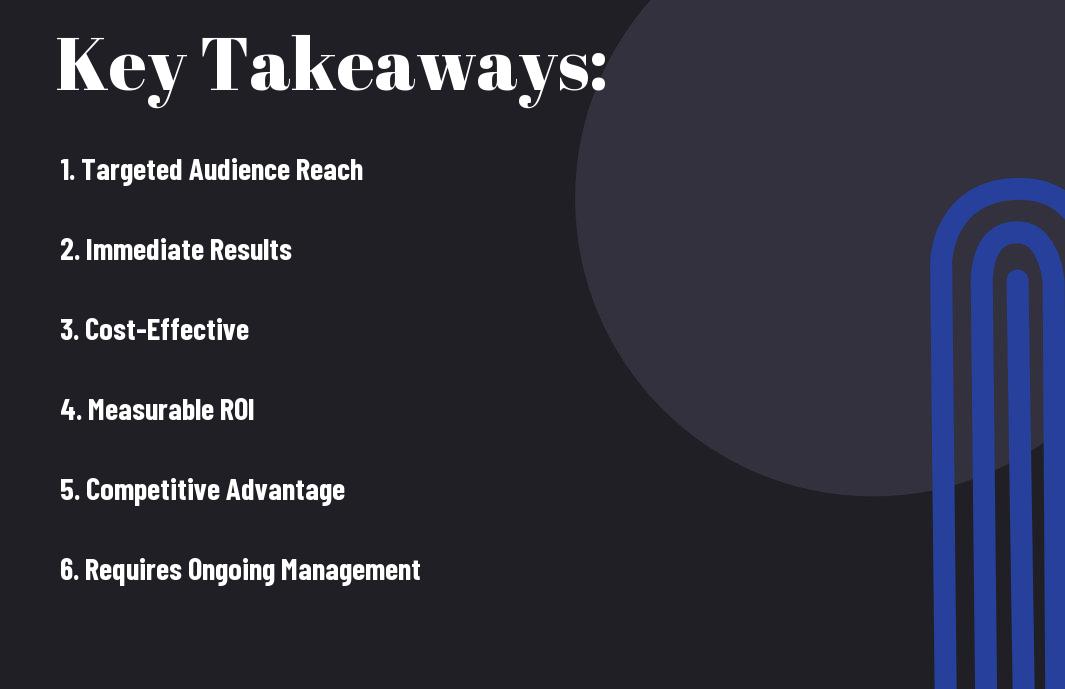Intrigued by the concept of Pay-Per-Click (PPC) advertising for your business? Before you invest your hard-earned money into a PPC campaign, it’s crucial to determine whether it’s the right strategy for your specific business. PPC advertising can be an extremely effective way to drive targeted traffic to your website and increase your sales, but it also comes with its fair share of risks and challenges. In this blog post, we’ll explore the benefits and drawbacks of PPC advertising, as well as the key factors to consider when deciding if it’s the right fit for your business. Whether you’re a small startup or an established enterprise, this information will help you make an informed decision about whether PPC advertising is the right choice for your business goals.
Key Takeaways:
- PPC Advertising can be effective for businesses looking to drive immediate traffic to their website or landing pages.
- It is important to set a clear goal and budget before jumping into PPC advertising to ensure a positive ROI.
- Businesses need to regularly monitor and adjust their PPC campaigns to optimize performance and minimize wasted spend.
- PPC advertising can provide valuable data insights that can be used to inform other marketing efforts and improve overall business strategy.
- It may be beneficial for businesses to seek professional help from a PPC advertising agency to ensure they are getting the most out of their campaigns.


Elements of PPC Advertising
Now, if you are considering whether PPC advertising is right for your business, it’s important to understand the key elements that make up a successful PPC campaign. To learn more about which kind of businesses should use PPC, check out this Quora discussion.
Keywords and Match Types
When it comes to PPC advertising, choosing the right keywords and match types is essential. It’s important to conduct thorough keyword research to identify the main keywords that your potential customers are searching for. You can use tools like Google Keyword Planner to determine the search volume and competition for each keyword.
- Exact match: Your ad will only appear when someone searches for the exact keyword you have specified.
- Phrase match: Your ad will appear when someone searches for your specified keyword, as well as close variations of that keyword with additional words before or after.
- Broad match: Your ad will appear when someone searches for your specified keyword, as well as misspellings, synonyms, related searches, and other relevant variations.
- Broad match modifier: Your ad will appear when someone searches for close variations of your specified keyword, but not synonyms.
- Negative match: Your ad will not appear when someone searches for a specified keyword.
Perceiving the relevance of match types to your keywords is critical for achieving a high return on investment for your PPC campaign. It allows you to reach the right audience while minimizing wastage and maximizing your budget.
Ad Copy and Landing Pages
One of the key factors in the success of your PPC advertising is your ad copy and landing pages. Your ad copy needs to be compelling and relevant to the keywords you are targeting, grabbing the attention of potential customers and encouraging them to click through to your website. Your landing page should then deliver on the promise made in the ad, providing a seamless and relevant experience for the visitor.
Analyzing Your Business Model
Not every business model is suited for PPC advertising. Before you dive into a PPC campaign, it’s important to take a close look at your business model and determine whether PPC advertising is the right fit for your specific needs and goals.
The Role of Products or Services
When analyzing your business model, consider the types of products or services you offer. Are they unique or do you face a lot of competition in the market? Depending on the competitiveness of your offerings, PPC advertising may or may not be a viable option for you. Additionally, if your products or services have a high profit margin, PPC may be more feasible as it allows you to invest more in advertising without hurting your bottom line.
Identifying Your Target Audience
Another crucial aspect to consider when analyzing your business model for PPC advertising is identifying your target audience. Do you have a clear understanding of who your ideal customers are and where they are located? PPC campaigns can be highly targeted, but if you don’t have a solid grasp of your target audience, you may end up wasting money on reaching the wrong people. On the other hand, if you have a well-defined target audience, PPC can be a powerful tool for reaching and converting potential customers.
Advantages and Challenges of PPC
For more in-depth information on this topic, you can read our blog post Is PPC Advertising Right for Your Business?.
Immediate Traffic and Visibility
When you invest in PPC advertising, you can see immediate results in driving traffic to your website and increasing your online visibility. This is especially important if you are launching a new product or promotion, as it allows you to reach potential customers quickly and generate leads almost instantly. However, keep in mind that once you stop investing in PPC, the traffic will also stop, so it’s important to have a strategy in place for long-term visibility.
Budget Control and Cost-Effectiveness
One of the key advantages of PPC advertising is that it gives you complete control over your budget. You can set a daily or monthly spending limit, and you only pay when someone clicks on your ad. This makes it a cost-effective option for businesses of all sizes, as you can tailor your budget to your specific needs and goals. However, managing your budget effectively and maximizing your return on investment can be a challenge, especially if you’re competing in a crowded market.
Complexity and Competition
While PPC advertising has its advantages, it also comes with its fair share of challenges. The complexity of running successful PPC campaigns can be overwhelming, especially if you’re new to the advertising platform. You need to have a good understanding of keyword research, ad targeting, and analytics to ensure that you’re getting the best results. Additionally, with more businesses investing in PPC advertising, the competition for top ad placements can be fierce, making it harder to stand out and achieve a high click-through rate.
Implementing PPC in Your Marketing Mix
Your decision to incorporate PPC advertising into your marketing mix can have a significant impact on your business’s success. However, it’s crucial to ensure that you implement PPC in a way that aligns with your overall marketing strategy.
Integration with Other Marketing Efforts
Integrating PPC with your other marketing efforts is essential for maximizing its impact. By aligning your PPC campaigns with your SEO, social media, and content marketing strategies, you can create a unified approach that reinforces your brand and messaging across various channels. This integration can also help you reach a wider audience and improve your overall marketing efficiency.
Measurement and Optimization Strategies
Once you’ve integrated PPC into your marketing mix, it’s crucial to establish robust measurement and optimization strategies. Tracking the performance of your PPC campaigns is essential for understanding their effectiveness and identifying areas for improvement. By leveraging analytics tools and conducting regular performance reviews, you can make data-driven decisions to optimize your PPC campaigns for better results. This process allows you to continuously refine your advertising efforts and ensure that you’re maximizing your return on investment.
By integrating PPC with your other marketing efforts, you can create a cohesive and impactful strategy that strengthens your brand’s presence and resonates with your target audience. Additionally, implementing robust measurement and optimization strategies allows you to continuously refine and improve your PPC campaigns for maximum impact. 4 Indications That PPC is Necessary for Your Small Business, click here to learn more about the importance of PPC for small businesses.
Conclusion
Ultimately, whether or not PPC advertising is right for your business depends on your specific goals, budget, and target audience. If you’re looking for immediate results and are willing to invest in paid ads to increase your online visibility and drive traffic to your website, then PPC advertising may be a viable option for you. However, it’s important to carefully consider your financial resources and the potential return on investment before jumping into a PPC campaign. Additionally, it’s crucial to continually monitor and adjust your ads to ensure optimal performance. With the right strategy and execution, PPC advertising can be a valuable tool for growing your business and reaching your marketing objectives.
Is PPC Advertising Right for Your Business?
Q: What is PPC advertising?
A: PPC (Pay-Per-Click) advertising is a digital marketing strategy where advertisers pay a fee each time their ad is clicked. It is a way of buying visits to your site, rather than attempting to “earn” those visits organically.
Q: How do I know if PPC advertising is right for my business?
A: PPC advertising can be effective for businesses of all sizes and industries, but it is particularly beneficial for those looking to increase brand awareness, generate leads, or drive immediate sales. It may not be the best fit for businesses with a limited budget or with low-profit margins.
Q: What are the benefits of PPC advertising?
A: PPC advertising offers highly targeted and measurable results, allowing you to reach your specific audience and track the success of your campaigns. It also provides immediate visibility in search engine results and a flexible budget that can be adjusted based on performance.
Q: What are the potential drawbacks of PPC advertising?
A: While PPC advertising can yield a high return on investment, it can also be a costly venture if not managed effectively. It requires ongoing monitoring and optimization of campaigns to ensure maximum efficiency and can be competitive in certain industries, leading to higher costs per click.
Q: How can I determine if PPC advertising is right for my business?
A: Consider your marketing goals, target audience, and budget. It may also be beneficial to consult with a digital marketing professional who can analyze your business needs and recommend the most suitable advertising strategies. Conducting a trial campaign can also provide valuable insights into the potential success of PPC advertising for your business.
